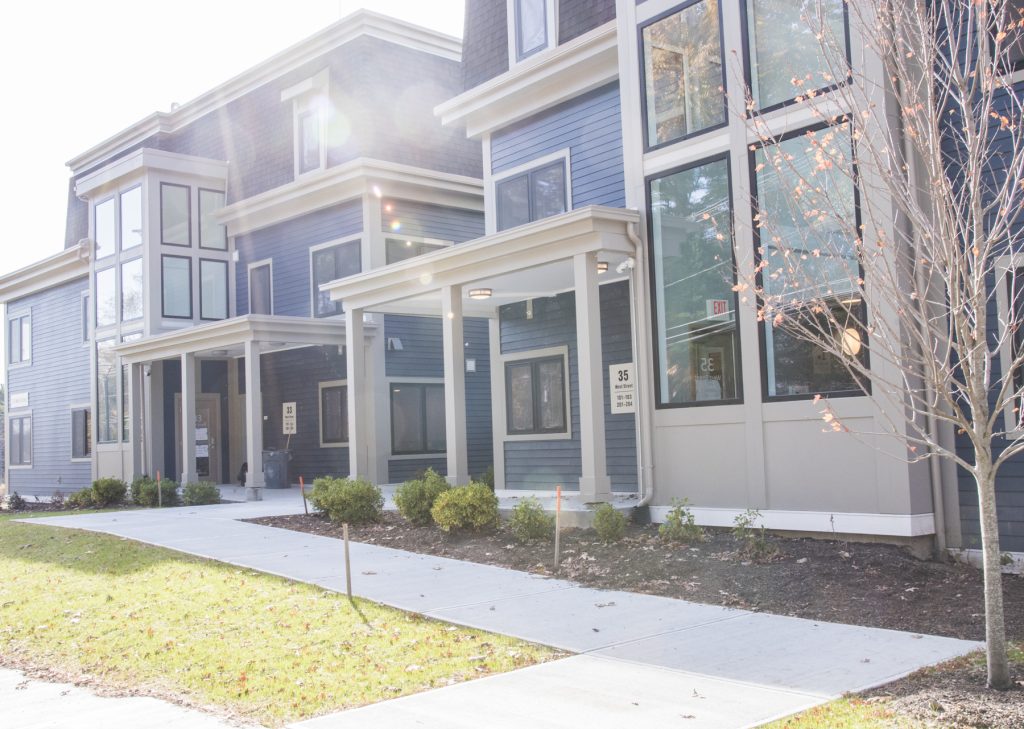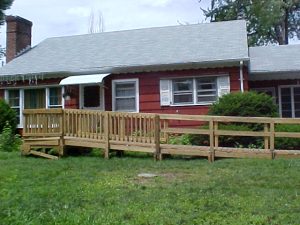In 1968, MA led the nation’s efforts to make communities accessible for all by creating the MA Architectural Access Board(MAAB) that balances the interests of property owners and accessibility needs by establishing and enforcing building codes during permitting, which is more efficient and affordable. Unfortunately:
- The MAAB was not given purview over workplaces.
- The MAAB does not have jurisdiction over renovations of buildings constructed before 1991.
The state of Massachusetts does not meet basic Americans with Disabilities Act (ADA) standards.
Learn more about the Massachusetts bills that would solve these shortcomings, and help us advocate for improved accessibility!
Download the Accessible MA Act Fact Sheet.
The Accessible MA Act
Senate Bill 1733
An Act Building a More Accessible Massachusetts
Sponsor: Senator Michael Moore
Everyone deserves to live and participate in communities – not forced to choose between an unsafe residence and a nursing home
- As spotlighted by the COVID-19 pandemic, living in nursing homes puts people at greater risk for disease than those who live independently. Over 60% of people who have died from the virus lived in nursing homes.
- 87% of our rapidly growing aging population does not want to relocate to nursing homes.
- An estimated 20%-40% of nursing home residents could live independently if we had enough accessible housing.
- According to the CDC, in-home falls from lack of accessibility features like grab bars cost Massachusetts $972 million per year.
- The best way for older adults and people with disabilities to live full and safe lives is to build housing that can be adapted to meet their changing needs.
- The Massachusetts Architectural Access Board(MAAB) balances the interests of property owners and accessibility needs by establishing and enforcing building codes during permitting, which is more efficient and affordable. However, the MAAB does not have jurisdiction over renovations of buildings constructed before 1991.
- Bills S1553 and H2291 will close this loophole and require that adaptability features be added, when reasonable, to any building being gut-rehabilitated into multi-unit housing.
Time for MA to provide accessible workplaces – a win for all
- Over 15% of the population has a disability and over 70% of working-age people in MA with ambulatory disabilities are unemployed.
- Businesses cannot recruit or retain the best workers when their facilities are inaccessible and qualified employees are being denied their civil right to engage in meaningful employment.
- MAAB code does not require workspace accessibility even in new or extensively renovated buildings, failing to meet basic Americans with Disabilities Act (ADA) standards.
- Bills S1553 and H2291 would give the MAAB purview over workplaces. Enforcing accessibility in new or extensively renovated workplaces will achieve crucial alignment with the ADA.
- The state will receive increased tax revenues and reduce expenditures for benefits.
- Everyone will benefit from the safety and convenience of workplace accessibility features. They will be assured that, if they or loved ones become disabled, they can continue to work.
Housing
Learn More about Adaptable Housing
- Nobody should have to choose between an unsafe residence and a nursing home
- Everyone deserves to live, work, and participate in their communities
- Make Massachusetts a leader in accessible housing again

Workplaces
Learn More about Accessible Workplaces
- Time for Massachusetts to provide accessible workplaces
- Creating accessible workplaces is a win for all
- The Accessible Workplaces MA Act will open doors to employment for people with disabilities

The Latest

Ramp Updates to Homes
The pictures show ramps and a lift added to homes or small apartment buildings. Some were built with professionals, and ...
For The Disabled, Office Accessibility Is Often A Dealbreaker — But It Doesn’t Have To Be
by Carol Steinberg for WBUR Cognescenti on November 9, 2018 Massachusetts law does not require all workplaces to be accessible ...
70% of people with ambulatory disabilities in MA are unemployed
Visit Instagram! This is not a matter of competence. It's a matter of access.MA code does not require workspace accessibility.The ...
Visionary ideas for senior living are great, but Mass. needs to act on making individual homes adaptable
by Carol Steinberg in The Boston Globe on May 3, 2021 I was quite impressed with the ideas presented in ...
COVID-19 poses unnecessary risk for people with disabilities
By Patrick Downes and Carol Steinberg May 29, 2020 for CommonWealth Magazine NEVER IN OUR lifetime have we witnessed a ...

Accessible Apartment
A shelf next to the door, no step entrances, wide doorways and handles instead of a knob are all features ...